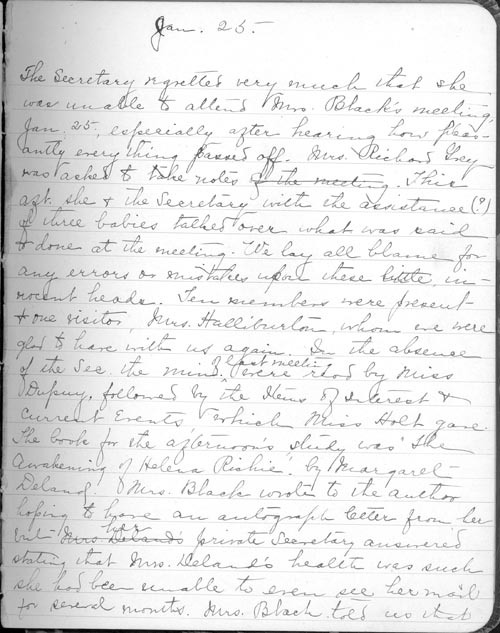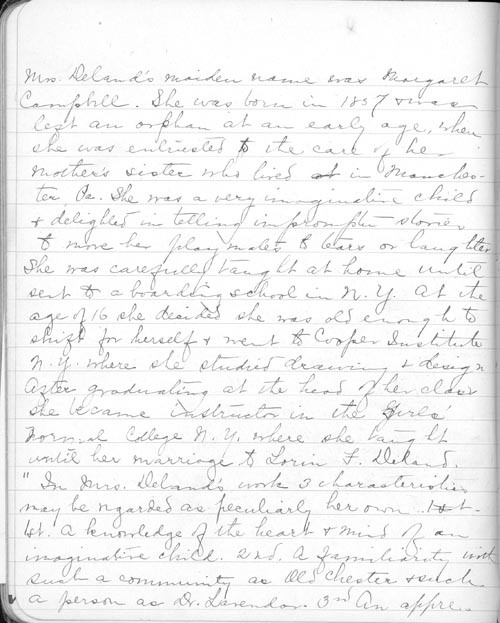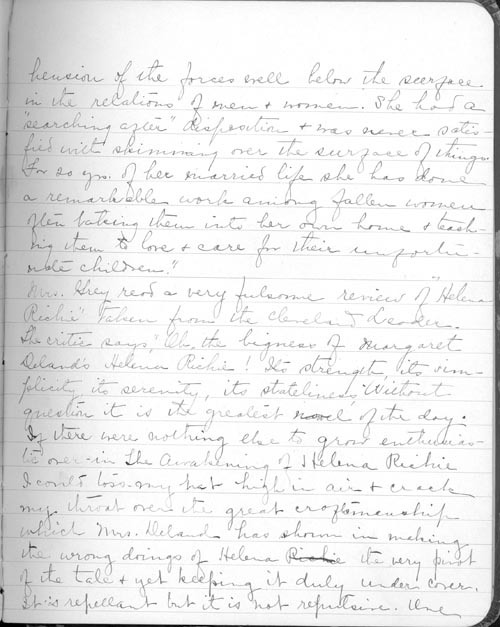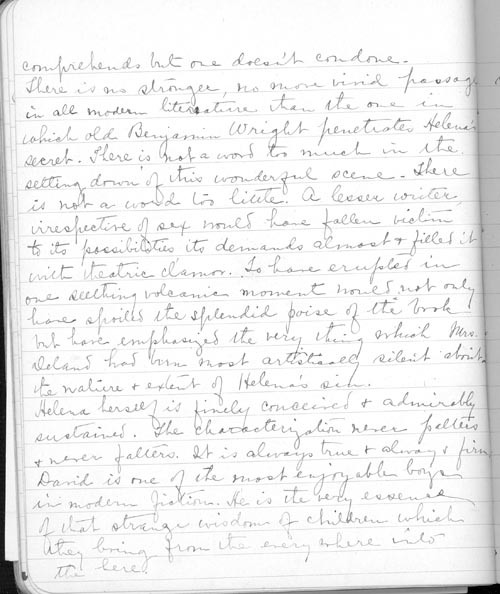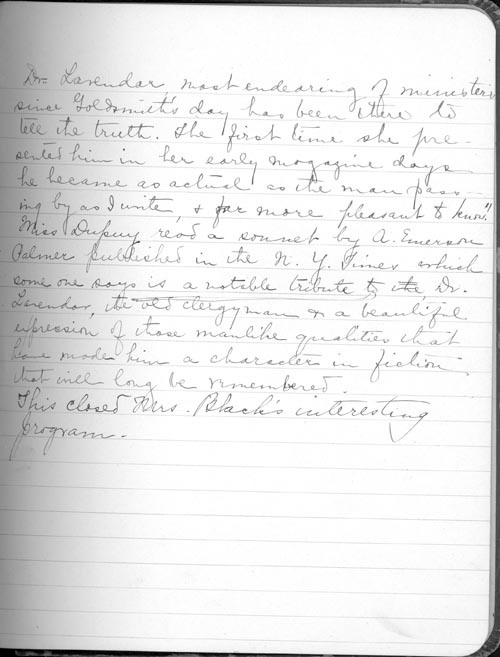Minutes 25 January 1907
Item
-
Title
-
Minutes 25 January 1907
-
Description
-
[Page 1] The Secretary regretted very much that she was unable to attend Mrs. Black’s meeting, Jan. 25, especially after hearing how pleas- antly everything passed off. Mrs. Richard Grey was asked to take notes of the meeting. This aft. she & the Secretary with the assistance (?) of three babies talked over what was said & done at the meeting. We lay all blame for any errors or mistakes upon these little, in- nocent heads. Ten members were present and one visitor, Mrs. Halliburton, whom we were glad to have with us again. In the absence of the Sec. the min. of the last meeting were read by Miss Dupuy, followed by the Items of Interest & Current Events, which Miss Holt gave. The book for the afternoon study was “The Awakening of Helena Richie” by Margaret Deland. Mrs. Black wrote to the author hoping to have an autograph letter from her but Mrs. Deland her private secretary answered stating that Mrs. Deland’s health was such she had been unable to even see her mail for several months. Mrs. Black told us that
-
[Page 2] Mrs. Delands’s maiden name was Margaret Campbill. She was born in 1857 & was left an orphan at an early age, when she was enlisted to the care of her mother’s sister who lived at in Manches- ter, Pa. She was a very imaginative child & delighted in telling impromptu stories to move her play mates to tears or laughter. She was carefully taught at home until sent to a boarding school in N.Y. At the age of 16 she decided she was old enough to shift for herself & went to Cooper Institute N.Y. where she studied drawing & design. After graduating at the head of her class She became instructor in the Girls’ Formal College N.Y. where she taught until her marriage to Lorin F. Deland. “In Mrs. Deland’s work 3 characteristics may be regarded as peculiarly her own. 1st 1st. A knowledge of the heart & mind of an imaginative child, 2nd. A familiarity with such a community as Old Chester & such a person as Dr. Lavendor. 3rd. An appre-
-
[Page 3] hension of the forces well below the surface in the relations of men & women. She had a “searching after” disposition & was never satis- fied with skimming over the surface of things. For 20 yrs. of her married life she has done a remarkable work among fallen women often taking them into her own home & teach- ing them to love and care for their unfortu- nate children.” Mrs. Grey read a very fulsome review of “Helena Richie” taken from the Cleveland Leader. The critic says, “Oh, the bigness of Margaret Deland’s Helen Richie! Its strength, its sim- plicity, its severity, its stateliness. Without question it is the greatest novel of the day. If there were nothing else to grow enthusias- tic over-in the Awakening of Helen Richie I could toss my hat high in air & crack my throat over the great craftsmanship which Mrs. Delan has shown in making the wrong doings of Helena Richie the very point of the tale & yet keeping it duly under cover. It is repellant but it is not repulsive. One
-
[Page 4] comprehends but one doesn’t condone. There is no stronger, no more vivid passage in all modern literature than the one in which old Benjamin Wright penetrates Helena’s secret. There is not a word too much in the setting down of this wonderful scene. There is not a word too little. A lesser writer irrespective of sex would have fallen victim to its possibilities, its demands almost & filled it with theatric clamor. To have erupted in one seething volcanic moment would not only have spoiled its splendid poise of the book but have emphasized the very thing which Mrs. Deland had been most artistically silent about - the nature and extent of Helena’s sin. Helena herself is finely conceived & admirably sustained. The characterization never patters & never falters. It is always true & always firm. David is one of the most enjoyable boys in modern fiction. He is the very essence of that strange wisdom of children which they bring from the every where into the here.
-
[Page 5] Dr. Lavendor, most endearing of ministers since Goldsmith’s day has been there to tell the truth. The first time she pre- sented him in her early magazine days he became as actual as the man pass- ing by as I write, & far more pleasant to know! Miss Dupuy read a sonnet by A. Emerson Palmer published in the N.Y. Times which some one says as a notable tribute to the Dr. Lavendor, the old clergyman & a beautiful expression of those manlike qualities that have made him a character in fiction that will long be remembered. This closed Mrs. Black’s interesting program.
-
Subject
-
Women-North Carolina-Davidson-Societies and clubs.
-
Books and reading.
-
Women-Societies and clubs.
-
North Carolina-Davidson.
-
Creator
-
BookLovers Club
-
Publisher
-
Davidson College
-
Date
-
25 January 1907
-
Rights
-
For permission to reproduce image, contact archives@davidson.edu
-
Language
-
eng
-
Type
-
text
-
Identifier
-
bl-065
-
Coverage
-
1907
-
4049696

